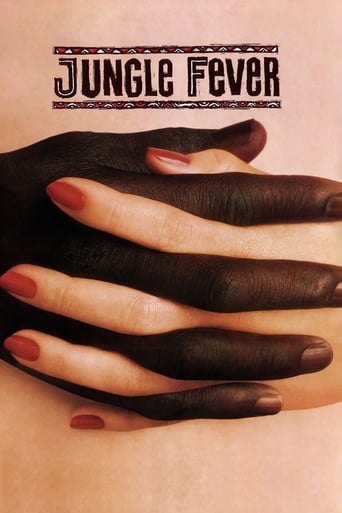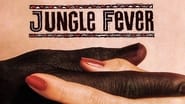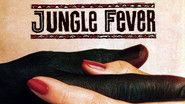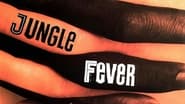TruthXSeeker
Jungle Fever focuses on two characters from different ethnic backgrounds who fall prey to forbidden lust/love. Although this is considered a romantic film with racial themes, I believe it was executed poorly. Granted, the main characters endured some bigotry from both eyes of the black/white spectrum due to their unorthodox relationship, however their situation made them both more unlikable to begin with. To explain, I think Flip( Wesley Snipes' character)was an asshole for cheating on his wife. There is no excuse for that. As for Angie,( Annabella Sciorra's character)she was a b!tc# for "succumbing to the devil and tasting the forbidden fruit" as the good reverend( Flip's dad) would say. I mean, She knew he was married and had a kid. Though without discrimination, they were both unlikable. All in all, it was a decent movie, but I did not care much for the main characters at all. They were too flawed, ordinary and despicable. However, Paulie(played by John Turturro) and Orin(Tyra Ferrell) were far more believable and likable characters. Although they only had about 10-15 minutes of screen time, they shared more chemistry than the main characters throughout the whole film. Minor SPOILERS, At least, Paulie had the balls to stick up for the girl he liked despite the hate he endured from his friends and father while walking to her house.
higherall7
The theme of 'forbidden love' is a fascinating one, and will be with us for all time. But the truth is, I felt very little chemistry between Flipper and Angie! Times have changed, thank god, and people are a little more relaxed about relationships between races of all kinds, but when it comes to interracial love relationships there are still certain things that I find arresting and certain things that fail to capture my interest. JUNGLE FEVER is about many things except what the title implies. This is okay, and a few other themes in the film are well explored. Everything except the core concept which gives a title to this film.After all, what is JUNGLE FEVER? What generates or causes it to come about? Is it Eldridge Cleaver's concept of the Super Masculine and Super Feminine? A woman of high social standing granting sexual favor to a man of low social standing because of sexual attraction between them? Or perhaps it's the exact opposite? When you have JUNGLE FEVER what are the signs and symptoms? What should you look out for and what should you avoid? Is it something you are bound to catch no matter how much you strive to resist it? Can you somehow guard against it? How do you catch it and what is the antidote for it? Before the turn of the 21st Century, people did not particularly look to have love relationships outside their race. The passion usually had to be great enough to compel one to cross the color line. For every man or woman there were perhaps a handful of people they would be willing to cross the color line for at the risk of social condemnation. But it was usually understood beforehand that this was a minority or nonconformist choice.Now when it comes to interracial relationships in films there are two things that I find appealing. The first is does the couple in question look physically compatible? Do they look like they belong together despite the physical difference of color? The second is whether or not you can sense magnetism between the couple in question or what people call these days 'chemistry'. Can you sense now or developing within the narrative a sense of 'bonding'? There was much ado about Denzel Washington playing Malcolm X and having his little interracial affair with Kate Vernon playing a blond white woman named Sophia. But when they sat together and spoke no lines you sensed a physical parity between the couple. They were both very good looking people of somewhat similar features and you could reasonably and easily see how they might come together on the basis of physical attraction or magnetism. Later on, in scenes with Angela Bassett playing Betty Shabazz, you also felt physical and emotional parity between Malcolm X and his wife.Between Wesley Snipes playing Flipper and Annabella Sciorra playing Angie I didn't sense any particular physical or emotional parity or when they were in the same space did it feel like they 'belonged' together. Nor did it seem to me either of them was resisting or fighting against catching the 'fever', before finally succumbing to it. It just seemed like Flipper and Angie got to know each other and decided to have casual sex. This is not particularly flattering, but it is as though Angie could have been anybody.Sidney Poitier was in two films where physical parity and emotional parity were either present or in the process of developing. In A PATCH OF BLUE there was some physical parity between the female lead and Sidney and you got the feeling you would not mind seeing them together. There was a certain dignity to them being together despite any social or cultural objections that could be raised or voiced. This was also true in GUESS WHO'S COMING TO DINNER where there was less physical parity, but you felt there was some kind of emotional bond already established between the man and the woman that would brook no interference and could not be revoked simply to meet the approval of others.Most films about interracial relationships swing between the extremes of being too staid or verge upon the pornographic. Both forms have their particular beauty to them. JUNGLE FEVER has a little of both approaches, but is actually more about the reactions of family and friends to this 'odd couple' rather than the intensity of emotions that have somehow bonded them together.
DemiRonin
Jungle Fever has a star packed cast that delivers marvelous performances. Unfortunately, they are wasted on Lee's loosey goosey directing. Jungle Fever opens with Spike Lee's favorite character of all time, New York. After a plethora of images of street signs, subways, Harlem, and the words "Spike Lee" we open on a slow motion shot of a newspaper flying through the air...which seems to have no other significance than presenting the words "The New York Times"! After which we see a sex scene with Flipper played by Wesley Snipes loudly making love with his black wife. Why mention black? Because this is a movie about race, and since Jungle Fever is not gonna put in the effort to tactfully express its theme neither will I. Flipper is an upper-middle class architect working at a firm controlled by two white men. Although putting it in pen and paper that he requests a black secretary instead he is given a young Italian American woman named Angie. Angie lives at home providing the motherly stand in for her very Italian father and brothers. Flipper and Angie, never having been intimate with anyone outside their race (except for Flipper's half Caucasian wife) work late into the evenings and eventually build an attraction to each other which Spike Lee calls "Jungle Fever". Thus, their interracial affair begins causing tension to build and explode between a multitude of characters. In addition Flipper also has a crack head brother played by Samuel L Jackson who runs around with his crackhead girlfriend played by Halle Berry looking to score cash from all his bloodlines including his poor mother who can't help but give into her 1st son when he does a little dance. The film's time is split between an assortment of characters who make up a collection of stories on interracial relationships and the ethnic hardships of New York Blacks and Italians. To give an example of how over handed and disjointed the racism is portrayed there is a scene where Flipper and Angie are pretend boxing. Flipper grabs Angie pinning her onto a car when Police officers show up forcing Flipper in a submissive position shoving a gun into his face. Obviously they had misread the situation but with Flipper screaming "I'm gonna kill you!" with his hands on her neck its understandable why the officers jumped to that conclusion. There's also a scene where Angie's father beats her for having relations with a "nigger". Perhaps it's the age of the film and people back then needed racism to be spelled out in a very overt and sensational manner. Jungle Fever is without a center jumping all over the place with extremely poor editing. The editor Samuel Pollard has edited mainly documentaries since, which is fantastic. The further he stays away from narratives the better. I'm trying to figure out how these scenes possibly transitioned into one another in script. I know that Lee likes to do harsh transitions but this film is just ridiculous. Jungle Fever is littered with ueven pacing and scenes that lose their punch because people need to walk in and out of frame. Example: Flipper and Angie are being ignored at a restruant because they're interracial then at the end of the scene when Queen Latifah, playing the waitress, walks off there's a 3 second cutaway where two bystanders say "She's White!?" "Mhmm Hmm" Jungle Fever is a film that indulgently satisfies itself. You feel ever bit of Lee's directorial manipulation while be beats you over the head with dialogue after dialogue about people's opinion on race & society. In fact there is a four minute scene of 5-6 black women just talking in a room about how about how they are disenfranchised. What is the point of a camera if you're just going to film taking heads? The camera angles and techniques in this film are all over the place in this film. In a scene where Flipper is asking for partner the camera just spins around them for about 3 minutes. I'm sure it was hard technique to film but why do these obtrusive techniques show up randomly throughout the film. I'm wondering if Lee showed up on set and rolled a dice every day. "OH look It's a 3, that means today I wanna put me and Wesley on a dolly and we are just gonna do this scene like we're drifting like ghosts". Strange camera techniques like these make me believe that Spike Lee wanted to make an experimental film. On the plus note all the actors are amazing and Spike Lee has a great eye for talent. Samuel Jackson STEALS this movie! Every scene with Jackson is a treasure and I'm sure when he's given his life time achievement award and there showing clips of his work, Jungle Fever will be contained in that reel. This movie is fun to watch to watch for the acting but I would recommend a more contemporary film such as "Everday People" [2004] if you wanted to see a New York film dealing with race.
bob the moo
Flipper Purify is a successful architect with a beautiful wife and a smart young daughter back at his apartment. When he gets a new temp in to work alongside him he is not pleased that she is white but her hard work impresses him. Working late one night, chatting becomes a connection which becomes flirting which becomes sex. Their affair continues even as Flipper quits his job to branch out alone. However his life is thrown into chaos when his wife Drew finds out.The opening credits are catchy and the material is just the sort of racial issue that Spike Lee made his name but somehow the film itself really failed to catch my imagination or hold my attention. The central plot is simple enough but Lee fills it out with characters, debate and a couple of subplots but yet somehow doesn't manage to pull it all together into one compelling film. Of course those that like Spike Lee know that even when he is at his most average he can still make an interesting film. And so it is here because the film does have plenty of interesting scenes but it is the narrative and formulation of his point where it fails to come off. In his defence Lee has written some convincingly real characters with unfortunately real attitudes but by leaving these people mostly unchallenged to deliver their opinions he allows two things to happen. Firstly the film feels like a series of disjointed conversations – most of which are interesting enough to listen to but don't a total film make.Secondly, and more importantly, Lee appears to be in agreement with some of his characters that mixed race relationships are not a good idea. If this is not his opinion then he has done a poor job in putting his thoughts across. If he is in agreement then he has done a poor job in presenting this point in a coherent and convincing fashion. Instead it seems like the racists have won – which is maybe is his point but if so yet again he hasn't done a good job of putting it across. In fact thinking about it, his point probably is that it all isn't worth the effort but, like I say, it isn't very well delivered and a lot of the ideas are half-cooked. The cast make it well worth a look regardless thanks to Lee's usual skill in assembling his actors. Snipes has massively fallen from grace in regards his career and his personal life but here he is pretty good. The material is just a little beyond his range but he does the basics well. Sciorra is better and works well with him. Lee is Lee while McKee is rather wasted with her simplistic race rage. Quinn is a nice touch in support while Turturro is as good as I have come to expect from him. Davis and Dee are good but they exist in another film, albeit the drugs subplot is interesting and both Jackson and Berry are impressive but it doesn't really fit. Lee's direction is his usual style but his use of soundtrack is weak – the tunes themselves are good but he doesn't put them across the film with any reason or sense of meaning.Overall then an fitfully interesting film as is usually the way with Lee but one that failed to come together or deliver a convincing central message. The depressing message that does come across isn't that well made and as a result isn't as thought provoking as it should have been. The casting is interesting though and the performances mostly do as required in the many good individual scenes. Famous but not as good as the names attached would make you hope.








